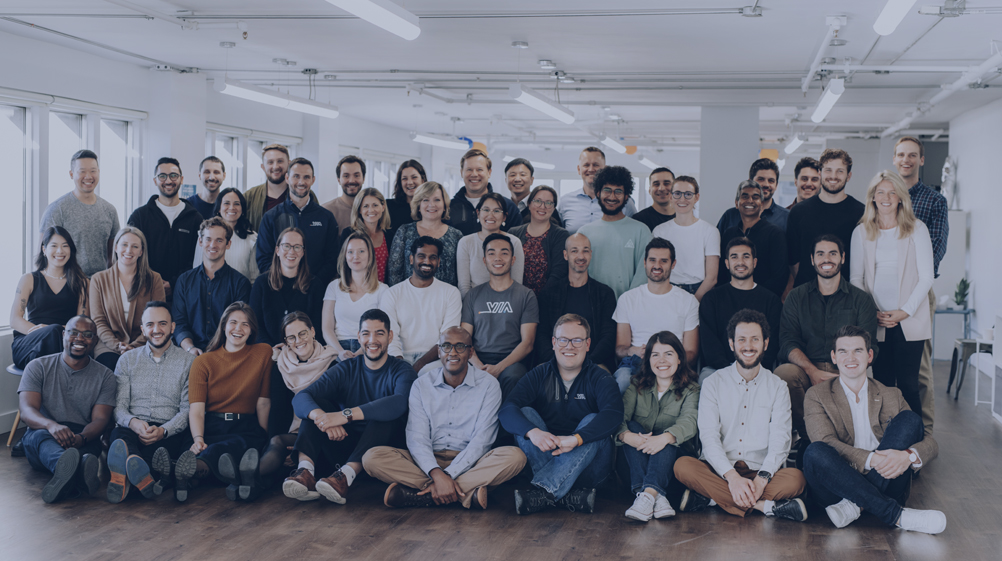

Via Science (VIA) was founded in 2016 with the mission to make communities cleaner, safer, and more equitable. VIA’s platform leverages AI and Blockchain technologies to help the U.S. Department of Defense and Fortune 500 companies around the globe enable real-time verification, ingestion, and privacy-preserving analysis of confidential data.
Building Values and Inclusion into Culture
With a clear mission, VIA’s founders established core values before day one and have continued to articulate and promote them ever since. Inclusion is a key pillar of the company – the team understands that if people are happy and motivated, they will be empowered to do their best work. This is captured in their value “love in = love out.” As a result, VIA has focused on creating a space in which everyone feels comfortable sharing their perspectives and ideas and, equally importantly, learning from the perspectives of others. This is encapsulated in their value, “challenge with respect, respect a challenge.” The team has achieved this through well- communicated systems and processes such as: a recruitment process that vets for values-fit, onboarding training that clearly defines company values, a clear communication model for ongoing code reviews, and matching every team member with a wellness advisor.
The VIA team understands that company culture cannot simply be codified in a book. Rather, culture must be integrated into a team’s day-to-day operations. At VIA, the team believes that a ealthy workplace culture is not something that only one person at the company can drive – it needs to be cultivated by every team member from one-on-one settings to larger groups. This approach has helped VIA create a close-knit, productive team that represents 20 different nationalities and speaks 14 languages.

Supporting the Infrastructure that Powers the World
The VIA team made the decision to focus on impact-oriented customers from the beginning. While there are many more mission-driven companies today, their decision was so extraordinary at the time of their founding that Harvard Business School wrote three case studies about their mission-driven strategy in 2018 and 2019. VIA’s decision to support essential infrastructure has paid off as the clean energy transition accelerated and the opportunity has grown in size. The VIA team initially started with a plan to develop AI to predict grid failure and support renewable energy integration. The team quickly found that the rate-limiting factor to impact was access to data. That is, data to fuel AI models while maintaining security was the most important piece of the puzzle.
That’s when VIA’s Web3 platform was developed. By enabling customers’ highly confidential data to be analyzed while keeping it in their possession, VIA provides the platform their customers need to coordinate with third parties to meet and track their progress towards their decarbonization goals.

Choosing Mission-Aligned Customers and Partners
When considering a potential partner or customer, the VIA team ensures that the organization is aligned with at least one of the three core components of VIA’s mission statement: helping communities become cleaner, safer, and more equitable. In this way, VIA’s approach of building core values and positive culture into the fabric of the company from the beginning comes full circle.
VIA’s ability to keep data secure and private is essential to these partnerships. The team now works with the largest national security and energy infrastructure organizations in the world.
As an example, a recent survey from the World Resources Institute states:
“We find that 95 percent of respondents are interested in VGI [Vehicle-to-Grid Initiatives] programs, mostly due to the chance to be greener, save energy, and earn a financial incentive.However, 94 percent of respondents are concerned with at least one feature of VGI, most commonly data privacy … Black, Indigenous, and people of color (BIPOC); lower-income people; and female respondents generally report higher levels of concern, specifically about VGI’s impact on data privacy.”
From electric charging data to predicting equipment failure, VIA supports these partners in solving urgent challenges including human well-being, carbon emissions reduction, and security of sensitive data.

